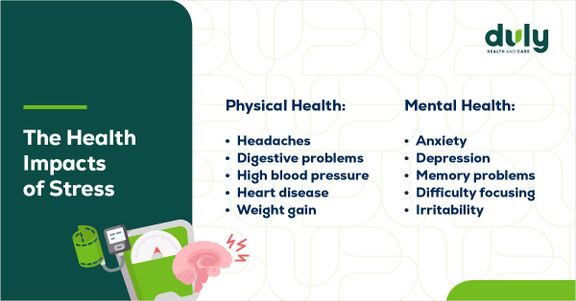Stress is common, and it often feels like there’s no avoiding it. Some versions of stress can be good, like the pressure to win a race or complete a challenging but rewarding project at work. Other versions of stress are less beneficial, and they can be harmful to your physical and mental health.

It might feel like being stressed is a given. But by being aware of stress triggers, you can reduce stress and protect your well-being. Here are 4 common causes of stress and how to limit their impact on your health.
1. Work
Excelling in your career is one thing. Being so stressed at work that it impacts your well-being is another thing altogether. Unfortunately, among adults in the US, work is often one of the primary causes of stress.
Workplace stressors include:
- Unmanageable workloads
- Low financial compensation
- Little room for growth or furthering your career
- Lack of support
- Work that is not engaging or interesting
For many people, stress doesn’t go away when they head home each day. Instead, it can continue to impact you after the workday, potentially damaging your mental and physical health.
Combating Work Stress
To reduce stress caused by work:
- Determine what’s causing the most stress, such as certain people or situations.
- Focus on healthy responses to work stressors, such as deep breathing and meditation.
- Solve issues by identifying the problem, brainstorming solutions, creating an action plan, and monitoring your results.
- Set clear boundaries, such as not checking your work email at home and not taking work calls during family time.
- Make time for yourself by regularly engaging in activities you enjoy.
- Use your vacation days — and be firm about steering clear of any work-related responsibilities during that time.
If necessary, talk to your supervisor to come up with a plan for how to reduce your stress and perform your best in your role.
2. Social Media and the News
Staying connected to the outside world is easier than ever with social media and news outlets. While this can be helpful, it can also be a daily cause of stress. When used excessively or prioritized over in-person interactions, social media may be associated with an increased risk of depression, anxiety, loneliness, and self-harm due to:
- Constant comparisons and feeling unhappy with your own life
- Feelings of being left out or missing out on life
- A lack of in-person connections with people you trust
- Cyberbullying, including rumors, abuse, and lies
- Being self-absorbed from constantly sharing pictures and thoughts
The news — which can also show up on social media — can lead to emotional distress due to the onslaught of negative events around the world. Because many news outlets and social media channels prioritize negative news, it can be overwhelming and lead to anger, anxiety, and unhealthy coping habits (such as increased alcohol consumption).
Are you struggling to manage stress on your own? Talk to a Duly Behavioral and Mental Health Provider, who can provide healthy coping mechanisms and support you as you manage stress.
Combating Social Media and News Stress
To reduce stress caused by social media or the news:
- Limit how much time you spend online or consuming the news.
- Turn off notifications for news or social media apps — or remove the apps altogether.
- Put away your phone for certain parts of the day, such as during dinner, while spending time with family, and in bed.
- Prioritize offline activities, such as spending time with friends and engaging in a hobby.
3. A Lack of Sleep
Sleep is a way for your body and mind to reset, recharge, and prepare for the next day. Unfortunately, 1 in 3 adults in the US say they don’t get enough sleep. Without enough quality sleep, your body and mind can be more prone to stress. Over 20% of adults say they feel extra stressed when they don’t get a good night’s sleep. Among those who are already more stressed, nearly half of them feel increasingly stressed without enough sleep.
A lack of sleep can also lead to feeling:
- Angry
- Irritable
- Overwhelmed
- Impatient
- Unmotivated
Combating Sleep-Related Stress
Reducing sleep-related stress starts with getting enough sleep. Adults should aim for 7 to 9 hours of sleep each night. It’s also important to ensure you’re getting quality sleep by:
- Going to bed and getting up around the same time each day
- Making your environment conducive to sleep by ensuring it’s dark, quiet, and a comfortable temperature
- Keeping electronic devices, including smartphones and TVs, out of the bedroom
- Limiting alcohol, large meals, and caffeine close to bedtime
- Exercising regularly
4. An Unhealthy Diet
Food is fuel for your body. If you give it low-quality fuel, it won’t perform at its best. That’s why a healthy diet is key to avoiding a number of problems, including stress. A diet that focuses on whole foods like fruits, veggies, fish, and nuts — as opposed to processed foods — has been connected with lower rates of anxiety, depression, and stress. The connection between stress and nutrition is a two-way street. While poor nutrition can cause stress, stress can also lead to nutrition-related problems, such as:
- Unhealthy cravings, such as for highly processed snacks and sweets
- Limited time to prepare healthy meals
- High levels of cortisol, which causes belly fat, potentially leading to insulin resistance and other serious health problems
Combating Diet-Related Stress
To reduce stress related to your diet:
- Prioritize a healthy diet, especially vegetables and foods with omega‑3 fats, like seafood and nuts.
- Meal plan to avoid turning to processed foods or eating out.
- Practice mindful eating, which involves paying close attention to what you’re eating and chewing food slowly.
- Emphasize other areas of your health, including getting enough sleep and exercising regularly.
Limiting and Managing Stress for Long-Term Health
Stress is a part of life, and it’s impossible to avoid it completely. By taking steps to limit common triggers, you can reduce how much stress impacts your well-being. When stress does occur, manage it productively by exercising, engaging in an activity you love, or talking to others. If your concerns persist, talk to a mental health professional who can support you in limiting and managing stress both now and down the road.
Health Topics:







